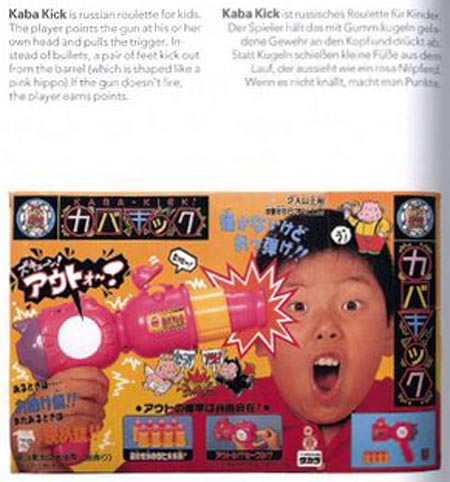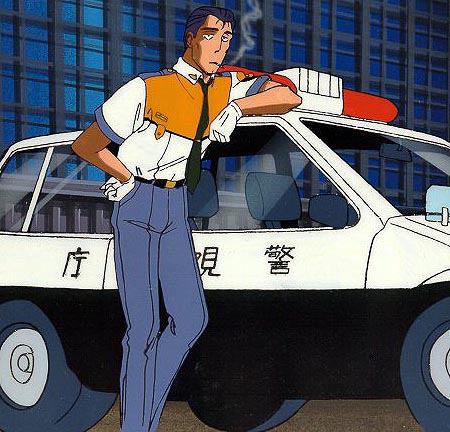

Top: Kaba Kick, a Japanese game of russian roulette for kids (I forget where I found this). If you lose, a pair of feet kicks out of the gun, which is shaped like a pink hippo. Artist Takashi Murakami, who has made himself a market force in the West selling to curators and art critics the easily-digestible idea that Japanese pop culture is about that nation's "impotence," would no doubt have a field day with this. In the interests of giving equal time to an opposing meme, the bottom image is Captain Goto, from the long-running TV adventure series Patlabor. "Patlabor" is short for "patrol labor"; a "labor" is an oversized robot that, in the near-future sci fi world of the series, is used primarily for construction work. Occasionally the stressed-out drivers of these powerful contraptions go berserk and the "mobile police" (also driving labors) have to be called in to restore order. The show somewhat resembles Taxi in being centered around a daily, humdrum work environment and follows a group of regular characters, the overworked, underpaid cops of Division Two, which Goto commands.
Goto's much like Humphrey Bogart in looks and demeanor--a supersmart, supercool guy who never lets on he's figured out a solution to a complex problem until time to put the plan into action. The show's juice is the contrast between his staff's daily bickering and the absolutely harrowing situations the job puts them in. Driving the monster robots is treated like a 9 to 5 gig but requires lightning reflexes, aggressive fighting skills, and a tolerance for hastily improvised solutions. As boss, Goto deals stoically with equipment shortages, departmental infighting, and short-fused subordinates and almost invariably thinks his way to a solution. In other words, the show has universal, positive appeal, and the "impotence" of Japanese society is the impotence of any other society (like, say, watching the slow motion train wreck of Bush's Iraq war and not being able to do a goddamn thing about it). It is uniquely Japanese in its focus on the "how-to" of the robots and the group energy devoted to their maintenance, and in showing how Division Two's sharp idiosyncratic personalities eventually reach consensus: even with Goto's guidance it is usually teamwork that wins the day.
This makes the series sound earnest but it is in fact fairly subtle in balancing the difficulties of life in a complex urban/industrial society with an upbeat story line. The cops have a knack for arriving late and operating in a state of crisis, but they do their jobs and mechanized society grinds on.
|
Top: Kaba Kick, a Japanese game of russian roulette for kids (I forget where I found this). If you lose, a pair of feet kicks out of the gun, which is shaped like a pink hippo. Artist Takashi Murakami, who has made himself a market force in the West selling to curators and art critics the easily-digestible idea that Japanese pop culture is about that nation's "impotence," would no doubt have a field day with this. In the interests of giving equal time to an opposing meme, the bottom image is Captain Goto, from the long-running TV adventure series Patlabor. "Patlabor" is short for "patrol labor"; a "labor" is an oversized robot that, in the near-future sci fi world of the series, is used primarily for construction work. Occasionally the stressed-out drivers of these powerful contraptions go berserk and the "mobile police" (also driving labors) have to be called in to restore order. The show somewhat resembles Taxi in being centered around a daily, humdrum work environment and follows a group of regular characters, the overworked, underpaid cops of Division Two, which Goto commands.
Goto's much like Humphrey Bogart in looks and demeanor--a supersmart, supercool guy who never lets on he's figured out a solution to a complex problem until time to put the plan into action. The show's juice is the contrast between his staff's daily bickering and the absolutely harrowing situations the job puts them in. Driving the monster robots is treated like a 9 to 5 gig but requires lightning reflexes, aggressive fighting skills, and a tolerance for hastily improvised solutions. As boss, Goto deals stoically with equipment shortages, departmental infighting, and short-fused subordinates and almost invariably thinks his way to a solution. In other words, the show has universal, positive appeal, and the "impotence" of Japanese society is the impotence of any other society (like, say, watching the slow motion train wreck of Bush's Iraq war and not being able to do a goddamn thing about it). It is uniquely Japanese in its focus on the "how-to" of the robots and the group energy devoted to their maintenance, and in showing how Division Two's sharp idiosyncratic personalities eventually reach consensus: even with Goto's guidance it is usually teamwork that wins the day.
This makes the series sound earnest but it is in fact fairly subtle in balancing the difficulties of life in a complex urban/industrial society with an upbeat story line. The cops have a knack for arriving late and operating in a state of crisis, but they do their jobs and mechanized society grinds on.
- tom moody 4-09-2005 8:21 pm